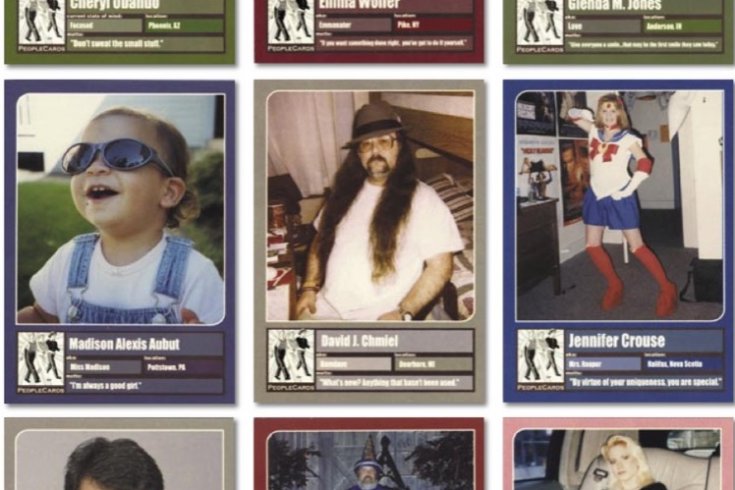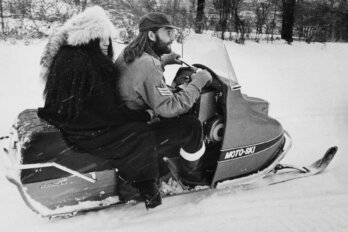Two years ago, an American musician set the world record for “longest keyboard marathon.” John Conte, a classically trained pianist and a member of a little-known avant-garde orchestra based in New Jersey, played nonstop for fifty-two hours and twenty minutes on a nightclub stage in Greenwich Village and, in so doing, earned himself notoriety and momentary celebrity. Articles reporting his feat appeared in newspapers ranging from the Cleveland Plain Dealer to the Turkish Daily News. The days leading up to the event were covered by a radio station in Jersey City, and he was interviewed on a Japanese radio program. Conte is now the subject of a documentary film, Shot, directed by his friend, the independent filmmaker Jim Riffel.
Through this tidal wave of publicity, no one has stopped to wonder why a forty-something, avant-garde pianist would actually want to set this record. What was a professional musician doing putting on such a crass stunt?
The weird world record has traditionally been the province of the amateur. One’s profession isn’t really relevant when it comes to pulling off such feats as owning the longest fingernails in the world or being one of twenty-five people who managed to cram themselves into a Volkswagen Beetle. Conte could have spent his fifty-two-plus hours stunning audiences with his virtuosity (apparently he played everything from Christmas carols to Beatles tunes). But someone with just a few hours of piano lessons under his belt could, conceivably, take the record away. By contrast, few could sit on stage for even five minutes and hold their own performing with an orchestra. And yet, it suddenly seems that we are more interested in the mere performer than in the bona fi de virtuoso. Everywhere you look, “ordinary peo ple” are emerging as entertainment personalities. Secretaries, students, and social workers who want to be singers, chefs, and hockey players are capturing the attention of countries, continents, the world. Thousands try out for Canadian Idol; millions watch and vote. A recent Idol spinoff on Arab satellite TV, called Superstar 2, turned an unknown Libyan dental student into a hero and made headlines in four newspapers in Canada. On shows such as cbc’s Making The Cut and nbc’s The Next Action Star, aspiring hockey players and actors audition for a chance at stardom. (The prize for the former is a place at an nhl training camp and for the latter a starring role in an action movie, Hit Me, produced by Joel Silver, executive producer of The Matrix.) Meanwhile, amateur contests of every sort, from competitive eating to spelling bees, pop up on national TV.
Talent contests and oddball competitions have always existed, as incentives for schoolchildren or as attractions at the local fair. Now, though, they’re a potential ticket to the big time — amateur events that, through hyper-intensive media attention, can catapult the best, or worst, performers to instant celebrity.
Consider William Hung, who earlier this year earned enthusiastic applause singing for fans at a Toronto Blue Jays game. Hung is the portly nerd with the buck-toothed grin who became a professional singer on the strength of his rendition of the song “She Bangs,” by Ricky Martin, in the American Idol tryouts. He famously didn’t make the cut, but his off-key, unselfconscious, and utterly joyful performance earned him a global following. He was, quite simply, the worst singer ever! And he sold more than a hundred and fifty thousand copies of his first album, Inspiration. His second album, Hung For The Holidays, is due later this month. Despite being unable to carry a tune, compose lyrics, write music, or even shake his booty to the beat, Hung has stumbled into the kind of career most professional musicians dream of. He is the poster boy for a new professional amateur class.
The dictionary describes an amateur (from the Latin amare, to love) as a person “who engages in a pursuit, study, science, or sport as a pastime rather than as a profession.” And leisure classes throughout time have always made room for the dabbler and the dilettante. In our own times, we seek to improve ourselves with activities such as planting a flower garden, taking piano lessons, and running in a marathon, despite — or because of — the absence of monetary or professional reward. As Steven Gelber, a professor at Santa Clara University, writes in his book Hobbies: Leisure and the Culture of Work in America, amateur pastimes are, in fact, meant to be a haven from the stresses of making a living. Hobbies, he writes, “passively condemn the work environment by offering a contrast to meaningless jobs.”
But a new force more powerful than the urge for mere self-improvement is changing this perception of amateur activity as a diversion from career, rather than a career in and of itself. As mass-media pop culture reaches into every nook and cranny of our lives, amateur and specialist are conflating, giving rise to the ultimate oxymoron: the expert amateur.
The rise of the professional amateur in the guise of the small-town singing hero, or comedian, or hockey player suggests that anyone can be an expert, anyone can be an entertainer. And the Internet, that great organ of democracy, has further encouraged the trend. There are some 1.5 million active bloggers online, many of whom feel free to critique TV shows, restaurants, books, or wars, without the slightest bit of professional training. Why should we listen to them? Why not?
The phenomenon of amateur-professional entertainment has created figures such as Ken Hechtman, the database programmer from Montreal who jumped headfirst into the Afghan war and contributed jovial, if not exactly informative, freelance commentary to both a Web site and an alternative weekly newspaper. Hechtman ended up a prisoner of the Taliban, who eventually let him go, giving him a place in the international press and access to an even broader audience.
Hechtman is a fine example of the professional amateur, someone who gains notice, attention, and even profit from doing something in an utterly amateurish — and yet somehow appealing — way. The competitors we see in the Olympics (“amateurs” who actually train full-time) induce in us a sense of awe at their example of self-sacrifice and commitment; the professional amateurs we now regularly encounter, on the other hand, exude the kind of bumbling optimism to which we can more readily relate. Our interest in, and affection for, this burgeoning group of entertainers derives from the fact that their actions are both attention-getting and in the realm of the possible. We, too, can sing very badly, can play video games, can sneak our way into a war zone and get arrested. No longer are we looking for the exclusive, the incredible, the transcendent. We are interested in the possible, the small, the amateur — that which we could conceivably do.
This can be a liberating notion. Some of the art created by so-called “outsider” musicians and artists, and championed by small record labels and fringe galleries, arguably qualifies as amateur work and is certainly worth bringing to the fore. Much of it has a sincerity and urgency that challenges the contrived, anemic efforts of an array of art-schooled social climbers. There is no question that many more voices are demanding, and getting, our attention.
The mainstreaming of amateur culture also has the undeniable virtue of being a respite from a mass culture that has otherwise demanded only our silent acquiescence. It’s no coincidence that the rise of the professional amateur entertainer has been accompanied by a shift in the role of the spectator. Consider the rapid growth in interactive entertainments such as the digi-satellite version of Hockey Night In Canada, for instance, where you work from a menu that invites you to choose your own camera angle, follow the statistics of particular players, get instant updates about the games you care about, and so on. For a price, you can be camera operator, television producer, and audience, essentially creating your own broadcast. As a result, you feel ever more invested in — and a part of — your own entertainment. So, what could be wrong with that?
The trouble is, the amateur professional, on or off the screen, does not have to be good at anything. In fact, one is more likely to succeed in this realm by being inexpert, a naïf. So where does that leave those who have worked hard to cultivate and explore a real talent? As Vinay Menon, the television critic for the Toronto Star wrote, about the Guinness World Records book on the occasion of that institution’s fiftieth anniversary this past summer, “In a sense, [it] has helped create a culture in which oddball feats are now validated, catalogued, and glorified as worthy accomplishments.” Amateur activities are put on par with truly great feats of strength, will, or the mind, most of which take years, if not lifetimes, to achieve.
The professional amateur equalizes accomplishment and, in so doing, diminishes true achievement. As Menon reported in his piece, when two American teens from Grand Rapids, Michigan, went for a world record by watching television for fifty-two hours straight (the magic number, apparently, when it comes to world records) inside an International House of Pancakes, their feat was greeted within their community with acclamation, rather than with the kind of disdain that adults used to reserve for kids who watch too much TV. As one of the proud fathers put it, “He has to be good at something; this is just as well. He set a goal and reached it.”
The real tragedy is that amateurism itself — doing something for the love of it — is fast becoming passé, and along with it a sense of play for its own sake. The more amateur activities turn professional, the less likely they are to actually be creative and fun. In Ontario,for instance, for the past two-and-a-half years, a program sponsored by the provincial government has been teaching children how to play. The kids are taught the rules of old games like hop-scotch and four-square. It seems that, somehow, young people, occupied by Nintendo and online interactive entertainment and reality TV, don’t know how to play. Like many adults, they are forgetting the amateur pursuits that came naturally in a world in which Scrabble was just a game, not a touring circuit with trophies and thousands of dollars at stake. ( In contrast, how many kids need instruction in the correct stance for crooning a pop song or delivering a press conference? This information seems to come to them so easily.)
Our obsession with the professional amateur likewise threatens to diminish the spirit of invention. Many of our most famous early innovators — people whom we now revere as experts — were dabblers. Leonardo da Vinci toyed with flight in between painting masterpieces. His thoughts on the subject would later influence the Wright brothers. Marconi was a twenty-one-year-old amateur when he invented the world’s first system for wireless telegraphy. The American statesman Benjamin Franklin is remembered for his work with the lightning rod, but he had a staggering array of other inventions, including the Franklin stove, the odometer, a flexible urinary catheter, and bifocals. (Franklin had very poor vision and decided to address the problem himself.) In fact, until recently, many of our great artists and creators lacked the accreditation of a Ph.D.; they were empowered not by a panel of experts but by their sense of exploration and fun: they pretty much made up their best work as they went along.
The explosion of amateur professionals erodes the amateur ideal of doing stuff just for the fun of it, out of interest, as an obsession, or just to see what happens. We’ve replaced that with a hunger to be noticed on a grand scale. Sonya Thomas, a thirty-seven-year-old from South Korea who is a high-ranking contestant on America’s “competitive eating circuit” (she has consumed an impressive 167 chicken wings in thirty-two minutes, among other things), once noted, “People always seem to recognize me wherever I go. They treat me like a star. It makes me feel special.” On the Web site iwannabefamous.com, people tell the world why they should be celebrated and recognized. Sixteen-year-old Rachel writes, “I want to give people the joy of seeing me in movies like my movie heroes did with me!!! I am sick of looking for a ‘regular’ job, I know that nothing but acting interests me, I feel life slipping by, and that ‘something is missing’ feeling begins to dominate me all day and night.”
With every hobby and activity a potential site of future celebrity, the Rachels of the world grow impatient: “something is missing,” and it’s the fame they believe they deserve, no matter what they have to give up in order to attain it.
Ultimately, a proliferation of amateur experts may prove no worse for our society than a proliferation of professional experts who aren’t, truth be told, always all that good at what they do either. (Is there much of a difference, when it comes to musicianship, between Canadian Idol’s Theresa Sokyrka and the singer Nelly Furtado? And Ken Hechtman was no less enlightening than some of his supposedly expert counterparts — remember Geraldo scratching maps in Iraqi sand as war raged all around him?) But the real question is, in an age of flat-lined entertainment in which all role models are the could-be-you guy or gal next door, what happens to hard work, commitment, real talent? Alas, they don’t quite fit into this scheme. Neither do geniuses, visionaries, or even just highly trained professionals interested in exploring an art form such as, say, experimental contemporary classical music.
Which brings us back to John Conte, whose record-breaking performance began as a last-ditch effort for some recognition. In fact, Conte and his friend Jim Riffel collaborated on the world record because they thought it might jump-start Conte’s career and promote a couple of films they had worked on together. “We were just trying to find a way to get some attention,” Conte explained. “It was the director’s idea.”
The stunt did pay off; one of the films, Black-Eyed Susan, was screened at the Garden State Film Festival, where it won the prize for best feature. And Conte was invited to play at the opening of the festival. But he was described only as “John Conte who broke the Guinness Book of World Records for continuous piano playing.” There was no reference to his many years of composing and performing. Though few would recognize Conte’s music, many now know his name. Conte the professional amateur is more famous than Conte the professional composer and musician will ever be.




